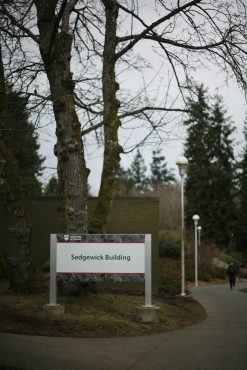Vic has continued the implementation of its months-old Sexualized Violence Prevention and Response policy with the institution of a Sexualized Violence Resource Office.
The policy, ratified by UVic’s Board of Governors in March 2017, mandated the creation of an Intake Office to act as a centralized point of access for people reporting an act of sexualized violence or seeking education about the topic. The office was opened in July 2017 and is situated in the Equity and Human Rights office in the Sedgewick Building (office C115).

UVic’s new Sexualized Violence Resource Office is located within the Equity and Human Rights Office within the Sedgewick Building. Photo by Belle White, photo contributor
Leah Shumka is the new sexualized violence education and prevention co-ordinator at UVic. Shumka runs the newly opened Resource Office and helps coordinate education efforts on campus.
“[The] office is a central hub for information and advice, specifically in relation to the policy, but it’s also a central point in which to access resources and supports for folks,” Shumka says.
As per an earlier Martlet article, the Resource Office does not replace other resources that currently exist to assist those impacted by sexualized violence (resources offered by places like Campus Security, Health Services, and Counselling Services). Instead, it aspires to be a central access point place for initial contact following an instance of sexualized violence, re-directing students to whichever campus service best suits the specific need.
“[My job is] ensuring that moving forward that we’re responding to sexualized violence that does occur in a survivor-informed and trauma-centred way,” Shumka says. “It’s ensuring that all people interacting with the policy are dealt with in a fair, transparent way, and everyone is aware of the policy [and] what their rights and obligations under it are.”
Shumka also works closely with the entire UVic community to make sure the entire campus understands the new sexualized violence policy and the principles behind it.
“It’s about pushing out the policy, making sure that the entire campus community is aware that there is a policy, that they understand the underlying, fundamental principles of the policy, that they understand how we’re defining the term sexualized violence,” Shumka says. “[And why] that is a first step in a larger objective to build awareness and do prevention work.”
Shumka has worked within the fields of gender and health for most of her professional life, but she says that working at a university is uniquely important.
“I think that it’s an especially important place to do this work because research tells us that there are some groups that are way more likely to experience sexualized violence than others,” Shumka says. “And a key demographic is self-identified women or in-trans folks between 18 and, say, 25. And so it’s [a] very important, pressing societal concern, but really a campus concern as well.”
Shumka received her bachelor’s and master’s degrees at UVic, and has taught in the Gender Studies department since 2014. Shumka also worked with Peers Victoria Resources Society, a grassroots agency dedicated to helping sex workers in Victoria.
Peers Victoria was one of the groups consulted when UVic’s working group was drafting the sexualized violence policy. The Anti-Violence Project (AVP)— a campus advocacy group focused on education around sexualized violence and support for survivors — was also consulted.
Meg Neufeld is the education coordinator for the AVP.
“I think it’s really exciting and needed,” says Neufeld on the office and the policy. “I think it’s a start. I think that it doesn’t have enough funding yet, but I think Leah is doing an amazing job with what she has.”
Neufeld is glad the university is starting to work to combat the issue of sexualized violence on campus, but hopes that people remember who put work into making change happen.
“The reason that the university has this policy is because a bunch of survivors did a bunch of work,” Neufeld says. “And so I think that it’s really great that it exists now, but I think that we just need to remember . . . it’s there for survivors and it’s there because of survivors. So, like you said, we’ve been doing this for twenty years. And we’ve been pushing the university to listen and understand that this is an important issue.
“It’s, like, thanks for finally joining us.”
Shumka has been in her role for two months, organizing meetings with department heads and administrators in a position to disseminate information about the new policy and the office.
The response from the community, Shumka says, has been massively positive, though she does understand that people may have reservations about the university’s previous response to sexualized violence.
“I would say that much, much consultation, thought, and care was put into this policy so that it would reflect and address their concerns, and do so directly, effectively, and for the long-term. It’s just been rolled out, it’s going to take us some time to do all that great prevention work and establish and create all the protocols, but we’re well on our way,” Shumka says.
“It’s a principled document, and I think that those principles are really going to make a difference on campus.”






